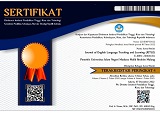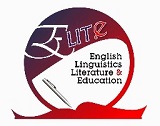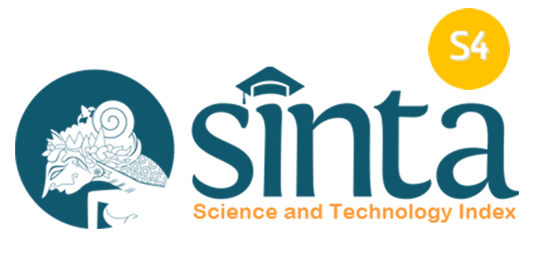Interpreting collaborative reasoning and instructional strategies in argumentative writing
Abstract
Keywords
Full Text:
PDFReferences
Clark, D. B., & Sampson, V. (2008). Assessing dialogic argumentation in online environments to relate structure, grounds, and conceptual quality. Journal of Research in Science Teaching, 45(3), 293–321. https://doi.org/10.1002/tea.20216
Domberg, A., Tomasello, M., & Köymen, B. (2021). Collaborative reasoning in the context of group competition. PLoS ONE, 16(2). https://doi.org/10.1371/journal.pone.0246589
Erduran, S., Ozdem, Y., & Park, J. Y. (2015). Research trends on argumentation in science education: a journal content analysis from 1998–2014. International Journal of STEM Education, 2(1), 1–12. https://doi.org/10.1186/s40594-015-0020-1
Guzel-Ozmen, R. (2006). The effectiveness of modified cognitive strategy instruction in writing with mildly mentally retarded Turkish students. Exceptional Children. https://doi.org/10.1177/001440290607200302
Ka-kan-dee, M., & Kaur, S. (2015). Teaching strategies used by Thai EFL lecturers to teach argumentative writing. Procedia - Social and Behavioral Sciences, 208(20), 143–156. https://doi.org/https://doi.org/10.1016/j.sbspro.2015.11.191
Kieft, M., Rijlaarsdam, G., & Van Bergh, H. Den. (2006). Writing as a learning tool: Testing the role of students’ writing strategies. European Journal of Psychology of Education, 21(1), 17–34. https://doi.org/10.1007/BF03173567
Kiesewetter, J., Fischer, F., & Fischer, M. R. (2017). Collaborative clinical reasoning-a systematic review of empirical studies. The Journal of Continuing Education in the Health Professions, 37(2), 123–128. https://doi.org/10.1097/CEH.0000000000000158
Kuhn, D., Hemberger, L., & Khait, V. (2016). Dialogic argumentation as a bridge to argumentative thinking and writing / La argumentación dialógica como puente para el pensamiento y la escritura argumentativa. Infancia y Aprendizaje, 39(1), 25–48. https://doi.org/10.1080/02103702.2015.1111608
Kuhn, D., Wang, Y., & Li, H. (2011). Why argue? Developing understanding of the purposes and values of argumentive discourse. Discourse Processes, 48(1), 26–49. https://doi.org/10.1080/01638531003653344
Landrieu, Y., De Smedt, F., Van Keer, H., & De Wever, B. (2023). Argumentation in collaboration: the impact of explicit instruction and collaborative writing on secondary school students’ argumentative writing. Reading and Writing. https://doi.org/10.1007/s11145-023-10439-x
Lenhart, A., Arafeh, S., Smith, A., & Macgill, A. R. (2008). Writing, Technology and Teens. Pew Interner & American Life Project.
Lin, T. J., Anderson, R. C., Hummel, J. E., Jadallah, M., Miller, B. W., Nguyen-Jahiel, K., Morris, J. A., Kuo, L. J., Kim, I. H., Wu, X., & Dong, T. (2012). Children’s use of analogy during collaborative reasoning. Child Development, 83(4), 1429–1443. https://doi.org/10.1111/j.1467-8624.2012.01784.x
Lo, J., & Hyland, F. (2007). Enhancing students’ engagement and motivation in writing: The case of primary students in Hong Kong. Journal of Second Language Writing, 16(4), 219–237. https://doi.org/10.1016/j.jslw.2007.06.002
Moonma, J., & Kaweera, C. (2021). Collaborative writing in EFL classroom : Comparison on group, pair, and individual writing activities in argumentative tasks. Asian Journal of Education and Training, 7(3), 179–188. https://doi.org/10.20448/journal.522.2021.73.179.188
Newell, G. E., VanDerHeide, J., & Olsen, A. W. (2014). High school English language arts teachers’ argumentative epistemologies for teaching writing. Research in the Teaching of English, 49(2), 95–119. http://www.jstor.org/stable/24398670
Philippakos, Z. A. T. (2022). Developing strategic learners : Collaborative reasoning with strategy instruction to scaffold debate and support the writing of arguments. The Language and Literacy Spectrum, 32(1). https://digitalcommons.buffalostate.edu/lls/vol32/iss1/3
Reed, C. (2006). Representing dialogic argumentation. 19, 22–31. https://doi.org/10.1016/j.knosys.2005.08.002
Reznitskaya, A., Kuo, L. J., Clark, A.-M., Miller, B., Jadallah, M., Anderson, R. C., & Nguyen-Jahiel, K. (2009). Collaborative reasoning: A dialogic approach to group discussions. Cambridge Journal of Education, 39(1), 29–48. https://doi.org/10.1080/03057640802701952
Rietdijk, S., Janssen, T., van Weijen, D., van den Bergh, H., & Rijlaarsdam, G. (2017). Improving writing in primary schools through a comprehensive writing program. Journal of Writing Research, 9(2), 173–225. https://doi.org/10.17239/jowr-2017.09.02.04
Rinda, R. K., Indrastana, N. S., Pramudita, R. F., Rohmana, W. I. M., & Suryanto, P. J. L. (2022). Cascading a new knowledge: the implementation of reference management software in the academic writing class. Journal of English in Academic and Professional Communication, 8(2), 71-77.
Rohmana, W. I. M., & Jianggimahastu, P. (2019). Error analysis of students’ recount text writing–junior high school student. Journal of English Language Teaching and Learning (JETLE), 1(1), 10-16.
Silva, R. De. (2015). Writing strategy instruction: Its impact on writing in a second language for academic purposes. Language Teaching Research. https://doi.org/10.1177/1362168814541738
Skoumios, M. (2009). The effect of sociocognitive conflict on students’ dialogic argumentation about floating and sinking. International Journal of Environmental and Science Education, 4(4), 381–399.
Traga Philippakos, Z. A., & MacArthur, C. A. (2020). Integrating collaborative reasoning and strategy instruction to improve second graders’ opinion writing. Reading and Writing Quarterly, 36(4), 379–395. https://doi.org/10.1080/10573569.2019.1650315
Wolfe, C. R. (2011). Argumentation across the curriculum. Written Communication, 28(2), 193–219. https://doi.org/10.1177/0741088311399236
Zhang, J., & Dougherty Stahl, K. A. (2011). Collaborative reasoning: Language-rich discussions for English learners. The Reading Teacher, 65(4), 257–260. https://doi.org/10.1002/TRTR.01040
DOI: https://doi.org/10.18860/jetle.v5i1.24024
Refbacks
- There are currently no refbacks.
Jalan Gajayana 50 Malang 65144, Jawa Timur, Indonesia

This work is licensed under a Creative Commons Attribution-ShareAlike 4.0 International License.
Indexed by





